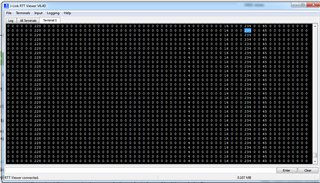Hi,
I am using nRF5 SDK 15.2 and the twi_sensor example to read over I2C a slave device 'WhoAmI' memory location. I first tx the slave address (0x68) and then attempt to read the memory location at 0x00. The expected value to be read back out is 0xEA (decimal 234). I am able to see this value be returned, but only after many read requests. Is there something that I may have setup wrong which may cause this?
/**
* Copyright (c) 2015 - 2018, Nordic Semiconductor ASA
*
* All rights reserved.
*
* Redistribution and use in source and binary forms, with or without modification,
* are permitted provided that the following conditions are met:
*
* 1. Redistributions of source code must retain the above copyright notice, this
* list of conditions and the following disclaimer.
*
* 2. Redistributions in binary form, except as embedded into a Nordic
* Semiconductor ASA integrated circuit in a product or a software update for
* such product, must reproduce the above copyright notice, this list of
* conditions and the following disclaimer in the documentation and/or other
* materials provided with the distribution.
*
* 3. Neither the name of Nordic Semiconductor ASA nor the names of its
* contributors may be used to endorse or promote products derived from this
* software without specific prior written permission.
*
* 4. This software, with or without modification, must only be used with a
* Nordic Semiconductor ASA integrated circuit.
*
* 5. Any software provided in binary form under this license must not be reverse
* engineered, decompiled, modified and/or disassembled.
*
* THIS SOFTWARE IS PROVIDED BY NORDIC SEMICONDUCTOR ASA "AS IS" AND ANY EXPRESS
* OR IMPLIED WARRANTIES, INCLUDING, BUT NOT LIMITED TO, THE IMPLIED WARRANTIES
* OF MERCHANTABILITY, NONINFRINGEMENT, AND FITNESS FOR A PARTICULAR PURPOSE ARE
* DISCLAIMED. IN NO EVENT SHALL NORDIC SEMICONDUCTOR ASA OR CONTRIBUTORS BE
* LIABLE FOR ANY DIRECT, INDIRECT, INCIDENTAL, SPECIAL, EXEMPLARY, OR
* CONSEQUENTIAL DAMAGES (INCLUDING, BUT NOT LIMITED TO, PROCUREMENT OF SUBSTITUTE
* GOODS OR SERVICES; LOSS OF USE, DATA, OR PROFITS; OR BUSINESS INTERRUPTION)
* HOWEVER CAUSED AND ON ANY THEORY OF LIABILITY, WHETHER IN CONTRACT, STRICT
* LIABILITY, OR TORT (INCLUDING NEGLIGENCE OR OTHERWISE) ARISING IN ANY WAY OUT
* OF THE USE OF THIS SOFTWARE, EVEN IF ADVISED OF THE POSSIBILITY OF SUCH DAMAGE.
*
*/
/** @file
* @defgroup tw_sensor_example main.c
* @{
* @ingroup nrf_twi_example
* @brief TWI Sensor Example main file.
*
* This file contains the source code for a sample application using TWI.
*
*/
#include <stdio.h>
#include "boards.h"
#include "app_util_platform.h"
#include "app_error.h"
#include "nrf_drv_twi.h"
#include "nrf_delay.h"
#include "SEGGER_RTT.h"
#include "nrf_log.h"
#include "nrf_log_ctrl.h"
#include "nrf_log_default_backends.h"
/* TWI instance ID. */
#define TWI_INSTANCE_ID 0
/* Common addresses definition for temperature sensor. */
#define LM75B_ADDR 0x68
//(0x90U >> 1)
#define LM75B_REG_TEMP 0x00U
#define LM75B_REG_CONF 0x01U
#define LM75B_REG_THYST 0x02U
#define LM75B_REG_TOS 0x03U
/* Mode for LM75B. */
#define NORMAL_MODE 0x00U
/* Indicates if operation on TWI has ended. */
static volatile bool m_xfer_done = false;
/* TWI instance. */
static const nrf_drv_twi_t m_twi = NRF_DRV_TWI_INSTANCE(TWI_INSTANCE_ID);
/* Buffer for samples read from temperature sensor. */
static uint8_t m_sample;
/**
* @brief Function for setting active mode on MMA7660 accelerometer.
*/
void LM75B_set_mode(void)
{
ret_code_t err_code;
/* Writing to LM75B_REG_CONF "0" set temperature sensor in NORMAL mode. */
uint8_t reg[2] = {LM75B_REG_CONF, NORMAL_MODE};
err_code = nrf_drv_twi_tx(&m_twi, LM75B_ADDR, reg, sizeof(reg), false);
APP_ERROR_CHECK(err_code);
while (m_xfer_done == false);
/* Writing to pointer byte. */
//reg[0] = LM75B_REG_TEMP;
//m_xfer_done = false;
//err_code = nrf_drv_twi_tx(&m_twi, LM75B_ADDR, reg, 1, false);
//APP_ERROR_CHECK(err_code);
//while (m_xfer_done == false);
}
/**
* @brief Function for handling data from temperature sensor.
*
* @param[in] temp Temperature in Celsius degrees read from sensor.
*/
__STATIC_INLINE void data_handler(uint8_t temp)
{
NRF_LOG_INFO("Temperature: %d Celsius degrees.", temp);
}
/**
* @brief TWI events handler.
*/
void twi_handler(nrf_drv_twi_evt_t const * p_event, void * p_context)
{
switch (p_event->type)
{
case NRF_DRV_TWI_EVT_DONE:
if (p_event->xfer_desc.type == NRF_DRV_TWI_XFER_RX)
{
data_handler(m_sample);
}
m_xfer_done = true;
break;
default:
break;
}
}
/**
* @brief UART initialization.
*/
void twi_init (void)
{
ret_code_t err_code;
const nrf_drv_twi_config_t twi_lm75b_config = {
.scl = ARDUINO_SCL_PIN,
.sda = ARDUINO_SDA_PIN,
.frequency = NRF_DRV_TWI_FREQ_100K,
.interrupt_priority = APP_IRQ_PRIORITY_HIGH,
.clear_bus_init = false
};
err_code = nrf_drv_twi_init(&m_twi, &twi_lm75b_config, twi_handler, NULL);
APP_ERROR_CHECK(err_code);
nrf_drv_twi_enable(&m_twi);
}
/**
* @brief Function for reading data from temperature sensor.
*/
static void read_sensor_data()
{
m_xfer_done = false;
/* Read 1 byte from the specified address - skip 3 bits dedicated for fractional part of temperature. */
ret_code_t err_code = nrf_drv_twi_rx(&m_twi, LM75B_ADDR, &m_sample, sizeof(m_sample));
APP_ERROR_CHECK(err_code);
SEGGER_RTT_printf(0, "%d ", m_sample);
}
/**
* @brief Function for main application entry.
*/
int main(void)
{
APP_ERROR_CHECK(NRF_LOG_INIT(NULL));
NRF_LOG_DEFAULT_BACKENDS_INIT();
NRF_LOG_INFO("\r\nTWI sensor example started.");
NRF_LOG_FLUSH();
twi_init();
LM75B_set_mode();
SEGGER_RTT_WriteString(0, "Printing over RTT!\r\n");
while (true)
{
//nrf_delay_ms(500);
do
{
__WFE();
}while (m_xfer_done == false);
read_sensor_data();
NRF_LOG_FLUSH();
}
}
/** @} */



